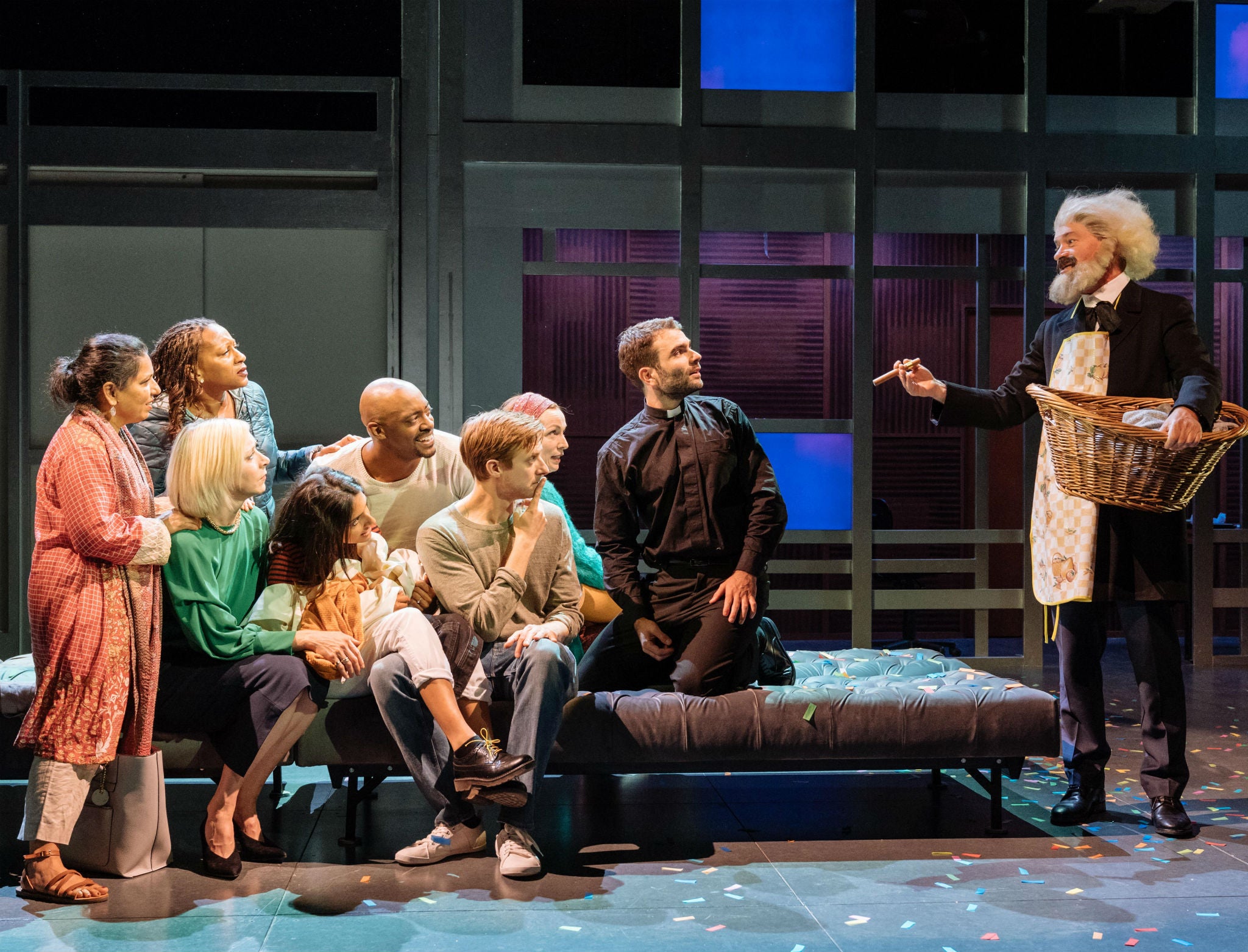Genesis Inc, Hampstead Theatre, London, review: Harry Enfield stars in an over-egged comedy about the fertility industry
Jemma Kennedy’s ambitious play has Enfield playing both Marx and God, while Jenni Murray lends her voice to a talking womb

Your support helps us to tell the story
From reproductive rights to climate change to Big Tech, The Independent is on the ground when the story is developing. Whether it's investigating the financials of Elon Musk's pro-Trump PAC or producing our latest documentary, 'The A Word', which shines a light on the American women fighting for reproductive rights, we know how important it is to parse out the facts from the messaging.
At such a critical moment in US history, we need reporters on the ground. Your donation allows us to keep sending journalists to speak to both sides of the story.
The Independent is trusted by Americans across the entire political spectrum. And unlike many other quality news outlets, we choose not to lock Americans out of our reporting and analysis with paywalls. We believe quality journalism should be available to everyone, paid for by those who can afford it.
Your support makes all the difference.It’s 40 years since Louise Brown became the first test-tube baby. Hampstead Theatre is marking the anniversary with Jemma Kennedy’s theatrical, ambitious comedy which attacks what it perceives to be the privatisation of human reproduction in today’s profit-driven fertility industry.
The piece is fuelled by personal disillusion. Kennedy has revealed that a couple of years ago she spent £4,500 to have her eggs frozen at a private IVF clinic. She describes this as a “brutalising” experience because it felt that it was all about money. At a time of great emotional upheaval, there was no counselling or attempt to assess whether this was the right option for her, or any acknowledgement that chances of success with this procedure are slim.
It will give you some idea of the surprising tone of the resulting play if I reveal that Harry Enfield portrays Dr Marshall, the sanctimonious director of the eponymous clinic, but also the characters of Karl Marx and God. Or report that there are vocal parts for a vagina and two ovaries and that when a womb speaks, it is with the (recorded) voice of Jenni Murray from Woman’s Hour.
Marx refuses to expend pity on a woman desperate to have a late baby: “Your idea of sexual equality was to sacrifice your reproductive rights to the needs of bankers and factory owners. And now you are forced to buy them back at inflated prices. It’s no surprise that your organs have turned against each other.”
“Typical mansplaining,” object the ovaries.
The anti-capitalist satire and the excursions into the fantastical earn their right to co-exist in Laurie Sansom’s cleverly marshalled production. It suggests that there is a surreal dimension to the clinic and its chic peddling of often false hope, as well as to the inner worlds of those caught up in the angst of infertility.
Laura Howard plays Bridget, a 42-year-old high-flying banker, who knows how irresistible a proposition the clinic is for market flotation. There’s a 70 per cent failure rate for IVF and yet business is booming. There’s no government regulation of private fees; there’s a withdrawal of NHS treatment, and seemingly infinite demand for assisted conception.
The clincher in her pitch to Marshall is that she had her own eggs frozen there and so understands the company intimately. She convinces the buyers that “they’re giving real agency to women just like me”.
Balance is not one of this play’s virtues. There are no female characters who can claim to have had a more positive experience with the fertility biz. The plot is complicated and not always plausible, with one or two puzzlingly dated aspects.
Where gay couples are now having children of their own, the play gives us Miles (very funny Arthur Darvill): Bridget has been his best friend since university days when she was his last female lover before he came out. He works as a music teacher at a Roman Catholic and feels the need to recruit Bridget’s services as a pretend fiancée. But when she suggests that they have a baby together, he declines.
Meanwhile, Jeff (Oliver Alwin-Wilson), who already has a daughter from an early fling, is furious at the clinic’s unflinching exploitation of the desperate misery of his infertile wife Serena (Ritu Arya). “She’s an addict. You may as well offer a junkie a dose of heroin,” he cries on learning that the clinic has offered her a loan for a further two full cycles.
The play suffers from overkill, though, so I found that additional, painful stories never touch the heart.
We’re asked to believe that, in order to scrape together his first mortgage, Miles donates his sperm for £1,000 to Serena, whom he meets by accident. We see him masturbating in a room in the clinic where his handiwork is surreally interrupted by, among other people, Susan Sontag on the linguistics of infertility and a spectral hooded teenager who is the might-have from his college days with Bridget. They all have intriguing things to say about Miles’s dubious motives for supplying semen now, and the episode is clever and funny.
It isn’t until the end of the show, though, and the heartfelt declaration in song that there are loving types of family that could never be made in laboratories, that simple feeling gets its due. Before that, less would be more.
Until 28 July (hampsteadtheatre.com)
Join our commenting forum
Join thought-provoking conversations, follow other Independent readers and see their replies
Comments